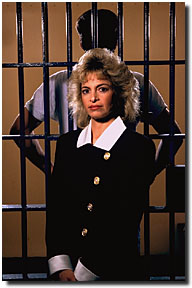
|
|
|
By launching Joseph O'Dell into cyberspace, New England School of Law student Lori Urs hopes to free him from death row. (Photograph by Steve Krongard)
|
|
 ost Office Box 500, Death Row, Mecklenburg State Prison, Virginia. ost Office Box 500, Death Row, Mecklenburg State Prison, Virginia. Since 1986, that's the address where Joseph R. O'Dell III has received mail from his lawyer and other supporters. That year, he was convicted for the rape and murder of 44-year-old Helen Schartner -- a crime he steadfastly denies having committed. But recently, O'Dell got a second address: a Web site created by Boston-based law student Lori Urs. In cyberspace, O'Dell joins a growing number of prison inmates and death-penalty opponents using the Web to widen the debate over capital punishment. O'Dell, whose supporters say DNA testing proves that blood on his shirt and jacket was not that of the victim, calls the media "the court of last resort." But his case fell into media limbo in 1991, when the Supreme Court refused to hear O'Dell's appeal. Urs came up with the idea of a Web page in 1995 after O'Dell accused prison officials of "systematically" blocking his access to journalists. O'Dell doesn't have a computer, but he passes notes and musings to Urs, who posts them on his Web page. "My only access to the world is through the Internet and the World Wide Web," he says. That was also the case for Girvies L. Davis. Convicted of killing an Illinois farmer in 1978, Girvies was illiterate -- and thus incapable, his lawyers argued, of signing the written confession that police produced at trial. Davis' lawyer, Brian Murphy of Chicago, put together the first-ever Death Row Web page, complete with a flashing clock that counted down the days to his client's execution and easy instructions for posting email to then-Gov. Jim Edgar. The bid failed, however; Davis was executed by lethal injection in 1995.
|






